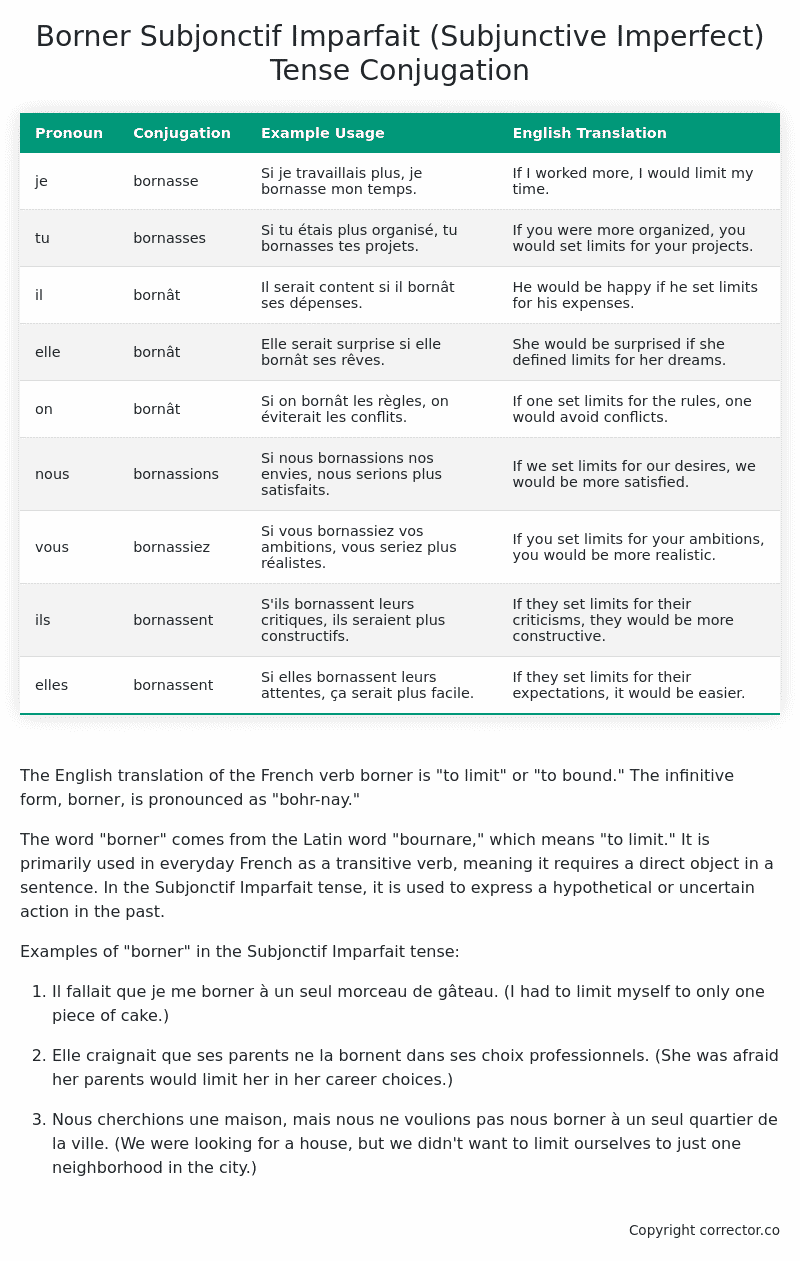Subjonctif Imparfait (Subjunctive Imperfect) Tense Conjugation of the French Verb borner
Introduction to the verb borner
The English translation of the French verb borner is “to limit” or “to bound.” The infinitive form, borner, is pronounced as “bohr-nay.”
The word “borner” comes from the Latin word “bournare,” which means “to limit.” It is primarily used in everyday French as a transitive verb, meaning it requires a direct object in a sentence. In the Subjonctif Imparfait tense, it is used to express a hypothetical or uncertain action in the past.
Examples of “borner” in the Subjonctif Imparfait tense:
-
Il fallait que je me borner à un seul morceau de gâteau. (I had to limit myself to only one piece of cake.)
-
Elle craignait que ses parents ne la bornent dans ses choix professionnels. (She was afraid her parents would limit her in her career choices.)
-
Nous cherchions une maison, mais nous ne voulions pas nous borner à un seul quartier de la ville. (We were looking for a house, but we didn’t want to limit ourselves to just one neighborhood in the city.)
Table of the Subjonctif Imparfait (Subjunctive Imperfect) Tense Conjugation of borner
| Pronoun | Conjugation | Example Usage | English Translation |
|---|---|---|---|
| je | bornasse | Si je travaillais plus, je bornasse mon temps. | If I worked more, I would limit my time. |
| tu | bornasses | Si tu étais plus organisé, tu bornasses tes projets. | If you were more organized, you would set limits for your projects. |
| il | bornât | Il serait content si il bornât ses dépenses. | He would be happy if he set limits for his expenses. |
| elle | bornât | Elle serait surprise si elle bornât ses rêves. | She would be surprised if she defined limits for her dreams. |
| on | bornât | Si on bornât les règles, on éviterait les conflits. | If one set limits for the rules, one would avoid conflicts. |
| nous | bornassions | Si nous bornassions nos envies, nous serions plus satisfaits. | If we set limits for our desires, we would be more satisfied. |
| vous | bornassiez | Si vous bornassiez vos ambitions, vous seriez plus réalistes. | If you set limits for your ambitions, you would be more realistic. |
| ils | bornassent | S’ils bornassent leurs critiques, ils seraient plus constructifs. | If they set limits for their criticisms, they would be more constructive. |
| elles | bornassent | Si elles bornassent leurs attentes, ça serait plus facile. | If they set limits for their expectations, it would be easier. |
Other Conjugations for Borner.
Le Present (Present Tense) Conjugation of the French Verb borner
Imparfait (Imperfect) Tense Conjugation of the French Verb borner
Passé Simple (Simple Past) Tense Conjugation of the French Verb borner
Passé Composé (Present Perfect) Tense Conjugation of the French Verb borner
Futur Simple (Simple Future) Tense Conjugation of the French Verb borner
Futur Proche (Near Future) Tense Conjugation of the French Verb borner
Plus-que-parfait (Pluperfect) Tense Conjugation of the French Verb borner
Passé Antérieur (Past Anterior) Tense Conjugation of the French Verb borner
Futur Antérieur (Future Anterior) Tense Conjugation of the French Verb borner
Subjonctif Présent (Subjunctive Present) Tense Conjugation of the French Verb borner
Subjonctif Passé (Subjunctive Past) Tense Conjugation of the French Verb borner
Subjonctif Imparfait (Subjunctive Imperfect) Tense Conjugation of the French Verb borner (this article)
Subjonctif Plus-que-parfait (Subjunctive Pluperfect) Tense Conjugation of the French Verb borner
Conditionnel Présent (Conditional Present) Tense Conjugation of the French Verb borner
Conditionnel Passé (Conditional Past) Tense Conjugation of the French Verb borner
L’impératif Présent (Imperative Present) Tense Conjugation of the French Verb borner
L’infinitif Présent (Infinitive Present) Tense Conjugation of the French Verb borner
Struggling with French verbs or the language in general? Why not use our free French Grammar Checker – no registration required!
Get a FREE Download Study Sheet of this Conjugation 🔥
Simply right click the image below, click “save image” and get your free reference for the borner Subjonctif Imparfait tense conjugation!

Borner – About the French Subjonctif Imparfait (Subjunctive Imperfect) Tense
Formation
Common Everyday Usage Patterns
Interactions with Other Tenses
Subjonctif Présent
Indicatif Passé Composé
Conditional
Conditional Perfect
Summary
I hope you enjoyed this article on the verb borner. Still in a learning mood? Check out another TOTALLY random French verb conjugation!


